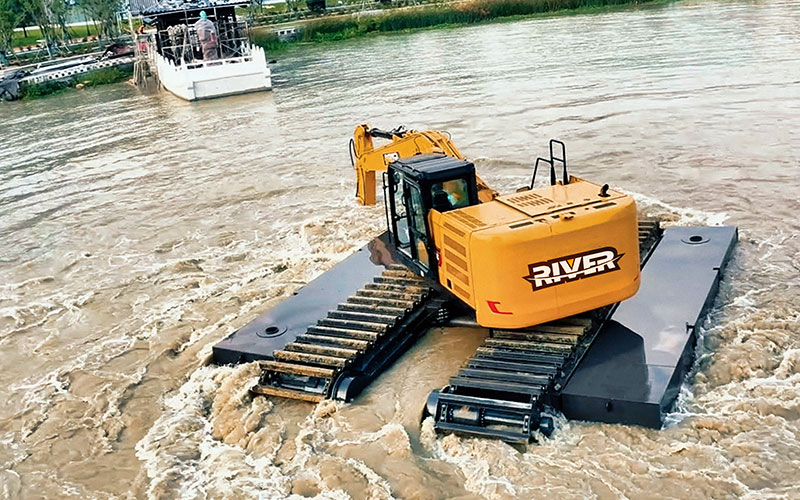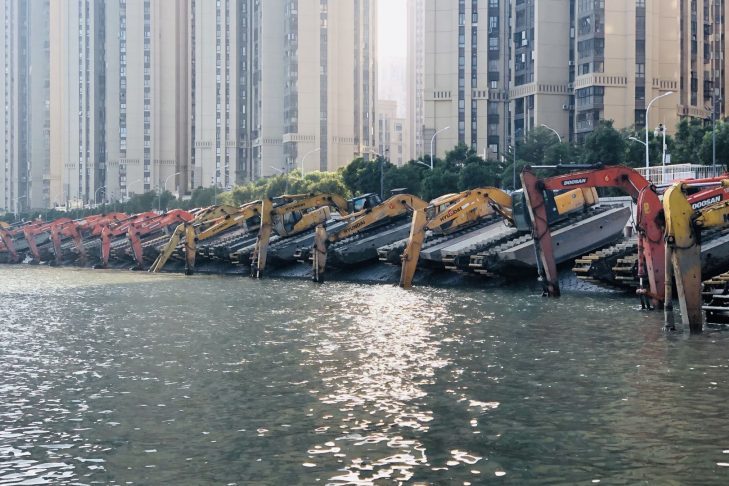Since 2003, River has been developing innovative solutions for waterway construction. The company is headquartered in China and has ISO9001 certification. It also boasts over 20,000 square meters of production facilities. River uses the extensive experience from 200+ dredging projects to continuously advance amphibious equipment. The pontoon excavator is the core contribution to revolutionizing the sector. It’s a specially optimized rig that can conquer even the most difficult terrain.
Specialized Design For Tough Terrain
River’s undercarriage is the key innovation that allows pontoon excavators to thrive in aquatic environments. River builds pontoons that are unmatched in terms of stability, flotation, and maneuverability. The pontoon excavartor allows for the navigation of challenges such as mud, swamps, and marshes. It also allows for the navigation of streams, shorelines, and streams that are immobilizing to traditional excavators.
River uses premium materials that are resistant to abrasion, which allows the excavators to withstand the harsh treatment of debris and grit. The HG785D steel used at all critical stress points in the pontoon frame has yield and tensile strength of 685MPa and 785MPa, respectively, which eliminates structural deformations that could compromise stability and balance during operation.
The track chain rollers are made of heat-treated 40Cr steel, hardened to 50-56 HRC for maximum durability. They support and guide the chains. Dacromet anticorrosive coatings are applied to exposed screws and fittings. These coatings can withstand 1,000 hours of neutral spray salt testing, which allows the excavator to work longer in a more severe working environment
Amphibious Function Multiplies Access
The River has a pontoon undercarriage that floats on water without sinking in soft terrain. The ultra-low ground pressure allows for maneuvering over saturated substrates and trenches without disturbing the underlying soil.
The traditional limitations are transformed into opportunities – dredging, expanding channels and fortifying shorelines as well as riverbanks can be done with just one rig. The requirement of additional land development, transport vessels, or secondary equipment is no longer required to begin work. Amphibious pontoons allow for multiple access points, allowing construction to begin quickly.
A highly maneuverable framework provides a narrow profile and tight turning radius, which allows navigation through congested zones such as swinging rivers or debris-laden waters. Pontoon excavators would not be affected by work barges or other heavy equipment.
The combination of compact maneuverability with direct access to waterways unlocks a wide range of versatility in virtually any inland terrain or waterway. The ability to access constrained spaces and freely navigate water surfaces makes reimagining the possibilities of infrastructure possible.
Maximized Performance Optimizes Project process
Excavators built for terrestrial use quickly become damaged by the harsh conditions on waterway construction sites. Equipment that can withstand constant abrasions, impact stress, vibrations, and corrosion are required to operate in extreme marine environments.
River Excavators studied the unique structural stresses and fatigue factors that standard excavators do not address. They redesigned key components and combinations using customized alloys and treatments to guarantee 1.5-2X life extension against crack propagation, wear, and corrosion. Protective coatings of maritime grade protect exposed fittings/screws against chemical corrosion when partially submerged.
River excavators are designed to maximize structural life and safety. They also provide enhanced reliability, damage prevention, and operational safety that is not possible with generic equipment.
In addition, pontoon excavators combine specialized functions to replace whole fleets of additional equipment. Their unique performance attributes translate directly into savings. Rental and labor costs are reduced by a significant amount when equipment is consolidated,
A channel expansion project, for example, was estimated to require eight pieces of equipment, including bulldozers and cranes. By choosing a pontoon-type excavator, the fleet was reduced to only two units. The remaining six were absorbed into a single unit, which allowed for the slashing of procurement/transportation expenses, operator costs, fuel consumption, and maintenance liabilities by over 60% collectively.

Continuous Advancements
River, a company that has specialized in waterway construction machinery for more than 15 years, considers itself constantly learning and improving its capabilities. The company uses feedback loops with clients, operators, and firsthand project experience to continuously improve technical capabilities and optimize performance.
River acknowledges every distinct marine construction environment presents unique demands. The engineering team creates custom solutions for exceptional projects, which open up possibilities that are impossible to achieve with a one-size-fits-all mentality. Rivers’ commitment to continuous improvement is evident in its continued efforts to break barriers in marine engineering.
River’s traditional pontoon-mounted excavators were designed to service excavators weighing 5-40 tons. However, the demand for larger production capacities led to the development of more robust solutions. We are now able to couple its systems with 60-90-ton primary drilling rigs to support high-volume dredging projects and marine construction. The company’s technological advancements continue to redefine the scale of possible projects as they evolve.
In addition, River understands that gaining insights into machine health and component wear is essential for a reliable, high-usage operation. The latest pontoon models have intelligent condition monitoring systems that track key sensors live.
Remote technicians can view detailed performance dashboards while operators receive real-time alerts about excessive structural strains. Instant visibility of critical indicators such as fluid pressures and micro-fractures transforms preventative maintenance into proactive maintenance, minimizing downtime and optimizing repair schedules.
Conclusion
The value of aquatic construction projects is immense, but many obstacles exist, including unreliable equipment and high operational costs. There are also environmental risks associated with using terrestrial excavators that have been removed from their natural environment.
River Machinery, a company with over 15 years of experience, has specialized in pontoon excavators specifically designed to overcome these constraints. Pontoon excavators deliver unprecedented productivity thanks to their instant mobility, versatility, enhanced durability, and turnkey processes optimized for marine environments. River continues to leverage hands-on experience in waterway construction to improve specializations and capacities for these amphibious workhorses.
River’s revolutionary engineering equipment is ready to revolutionize the engineering industry as infrastructure modernization initiatives focus more on aquatic environments, including harbors, dams, and rivers.

